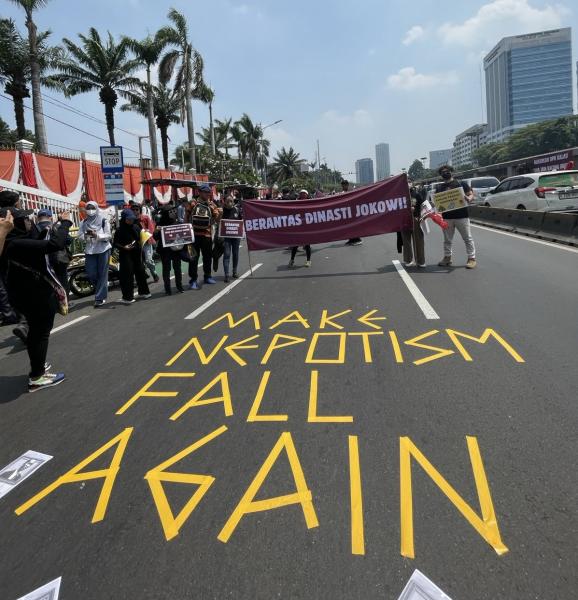Spending US$12.1 Million, Police Potentially Violating Tear Gas Procurement

Police Spent Around US$12.1 Million on Tear Gas and Equipment by February 2024
The #EmergencyWarning protest on August 22, 2024, in several regions raised several issues, one of which was related to the excessive use of force by the police. #EmergencyWarning is a protest initiated by citizen groups urging the government and parliament not to manipulate regulations to perpetuate President Joko Widodo's dynasty politics. The citizens' demands were met with brutal responses from the police, who indiscriminately used tear gas, resulting in casualties.
Based on investigations through the Electronic Procurement Service (lpse.polri.go.id) of the National Police, Indonesia Corruption Watch (ICW) found that the National Police made five purchases between December 2023 and February 2024. A total of US$12.1 million in taxpayer money was spent on tear gas, spread across two work units: the National Police's Mobile Brigade Corps and the National Police's Security Maintenance Agency.
There are three main issues regarding the National Police's purchase of tear gas to date:
- The National Police's Defiance in Disclosing Procurement Information: Despite requests from ICW, KontraS, and Trend Asia since August 2023, the National Police have refused to disclose the procurement contracts for tear gas. This suggests that the National Police may be hiding information. The lack of transparency, as mandated by the Central Information Commission Regulation No. 1 of 2021 on Public Information Service Standards (SLIP), should be seen as an early indication of problematic procurement, which could potentially lead to corruption.
Following the Police's refusal, ICW filed an information dispute with the Central Information Commission (KIP) in December 2023. However, KIP has yet to provide a resolution. ICW suspects that KIP is reluctant to process the dispute against the Police, not merely due to the busy agenda of resolving information disputes. According to SLIP regulations, the dispute process should not take long, as the information ICW requested is clearly public.
- Lack of Accountability for Tear Gas Use: According to ICW's findings, in one of the five procurement packages, the National Police provided information about the quantity of ammunition purchased, amounting to 38,216 projectiles. However, in the other four procurement packages, there was no detailed information on the number of rounds purchased by the Police. This lack of detail makes it difficult for the public to demand accountability, especially when the tear gas is used recklessly and brutally. Without accountability, the Police might be suspected of using expired tear gas, as seen in the Kanjuruhan tragedy.
- Purchases Made During Non-Emergency Situations: The purchase of tear gas during non-emergency situations raises suspicions that the exorbitant spending is merely an attempt to silence civil society criticism during the 2024 political year. Elevated public criticism is a logical consequence of electoral competition marred by dubious tactics. This also indicates the shallow security strategy of the National Police, which resorts to injuring taxpayers with tear gas instead of addressing their concerns. As a result, the Police's tear gas purchases add to the growing list of wasteful or inappropriate use of state funds.
Therefore, ICW demands that:
- The National Police cease using tear gas against protesters and citizen groups;
- The National Police immediately disclose the IDR 188.9 billion tear gas procurement contract funded by taxpayer money;
- The National Police immediately release an accountability report on tear gas use from 2019 to 2024;
- The National Police halt further tear gas purchases until all contract documents and accountability reports are made public;
- The Central Information Commission promptly follow up on the information disclosure dispute regarding the National Police's tear gas procurement.
Indonesia Corruption Watch
August 23, 2024
Contacts:
Wana Alamsyah (Researcher)
Almas Sjafrina (Researcher)










